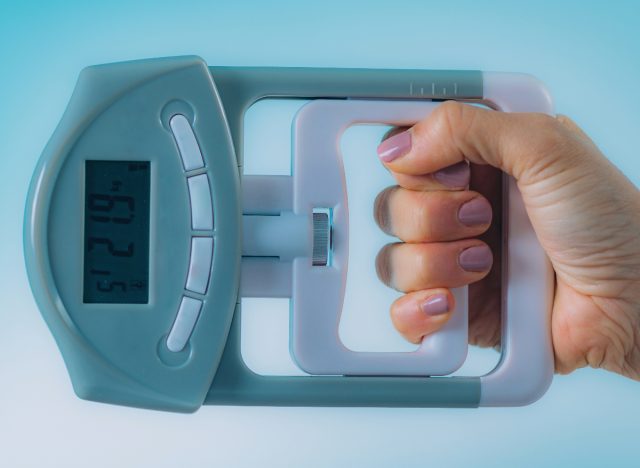7 Surprising Habits That Can Cause Serious Damage to Your Body

Many of us already have our daily routines set in stone. In these routines, there are certain habits we religiously follow—some of them good, others not-so-good. We here at Eat This, Not That! did some digging and spoke with an expert who calls out some of the most surprising habits that can seriously damage your body.
In order to lead a healthy lifestyle and avoid injury or long-term damage, it's important to kick these bad habits to the curb. Keep reading to learn all about them, and when you're finished, be sure to check out People Swear by the 30/30/30 Plan for Weight Loss: 'Completely Changed My Body'.
Overemphasizing isolation exercises

Some of the more surprising habits that can damage your body and hinder long-term fitness or weight loss progress happen at the gym. Tyler Read, BSc, CPT, the founder of PTPioneer.com and a personal trainer who has been involved in the health and fitness world for the past 15 years, explains, "Focusing too much on isolation exercises (like bicep curls or leg extensions) and neglecting compound movements (like squats or deadlifts) can lead to muscle imbalances and a lack of functional strength. Over time, these imbalances can cause postural issues and increase the risk of injury during everyday activities."
Being chronically slightly dehydrated

Let's be honest: Remembering to take a break from a busy workday to fill up your water glass can be challenging. However, drinking sufficient water during the day is so important.
"It's well known that you should stay hydrated, but chronic slight dehydration, which may not be immediately noticeable, can affect your muscles' ability to repair themselves and lead to a gradual decrease in strength and endurance," Read explains. "Over time, this can contribute to kidney stones and even kidney damage due to the increased concentration of urine."
Stretching too much before lifting weights

While many fitness pros advocate for static stretching to increase your flexibility, too much of anything is never a good thing. Over-stretching before strength training can temporarily reduce your muscle strength, along with stability in your joints, potentially resulting in injury, Read says. "Dynamic stretching is generally recommended to prepare for activity," he adds.
Not giving certain muscle groups TLC

Just as much as you can over-train a muscle group, you can also under-train it. "Everyone knows about the risks of over-training, but under-training can be just as harmful," explains Read. "Neglecting to train the back and core adequately, for instance, while focusing on more visible muscle groups like the chest and arms, can lead to a weak foundation, poor posture, and chronic back pain."
Ignoring grip strength

When it comes to workout goals, grip strength likely isn't at the top of your mind—but ignoring it altogether can result in a few pitfalls. "Grip strength is often an afterthought in workouts, but over time, a weak grip can limit your ability to perform key exercises, leading to diminished results and an increased risk of accidents or dropping weights," Read tells us.
Misusing weight belts

If you typically utilize a weight belt in your workouts, beware of misuse. "Weight belts are commonly used to support the lower back during heavy lifts, but relying on them too much can lead to weakened core muscles," says Read. "This can paradoxically increase the risk of lower back injuries over time, as the body becomes accustomed to the artificial support."
Not washing your sheets for a week.

Many of us are guilty of letting our bed sheets extend a bit beyond a week before tossing them in the wash. However, not washing them for an entire week—and beyond—can seriously harm your body and overall health.
According to research performed by Amerisleep, one-week-old pillowcases contained 3M colony-forming units (CFUs) per square inch—17,442 times the amount of bacteria you would find on a toilet seat! Pillowcases that went two weeks without a wash jumped up to harboring 5.98M CFUs. When it came to bed sheets, those that weren't washed for a week contained 5M CFUs—24,631 times the amount of bacteria you would find on a bathroom door knob.
Not washing your sheets for a full week, week after week, can lead to a vicious cycle of hurting your health and wellness. The research also pointed out that one of the types of bacteria you could find on your bed is called "gram-negative rods," which can result in antibiotic resistance.









